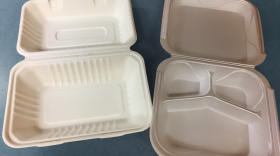Plastic pollution is choking landfills, the oceans - even the air we breathe.
Current recycling programs for plastics are inadequate to deal with the growing problem, according to researchers who testified Tuesday before a U.S. House subcommittee, convened by Michigan Congresswoman Haley Stevens.
Plastics production itself needs to be "revolutionized," according to Tim Boven, Dow's Recycling Commercial Director for Packaging and Specialty Plastics.
"Society is demanding it," he told the subcommittee members. "The plastic waste issue - you can't turn on the television, you can't go the internet without seeing it -- and society wants solutions to this."
Boven says the plastics industry needs to design recyclability into products from the very beginning. That would enable the products to be broken down into polymer building blocks - similar to the way paper is broken down into fiber.
Boven says on a wide scale, such recyclability-by-design would make plastics a sustainable industry - where plastic polymers are continuously reused.
That's opposed to the current situation, where many single-use plastics such as water bottles can only be recycled into lower-end products like carpets, before ending up in a landfill.
In her remarks, Stevens says she is concerned that cities in her district and across the country are considering ending their plastic recycling programs.
That's in large part because China has stopped accepting U.S. plastic recyclables.










